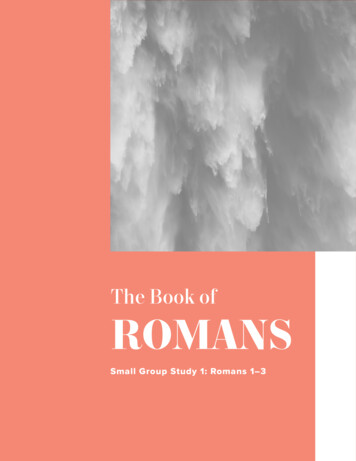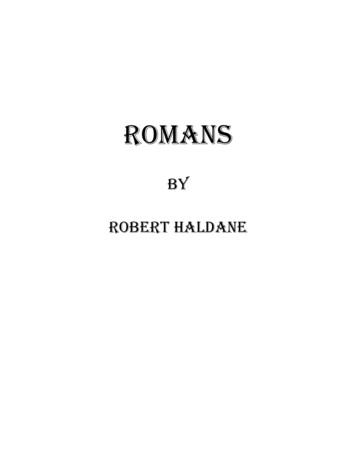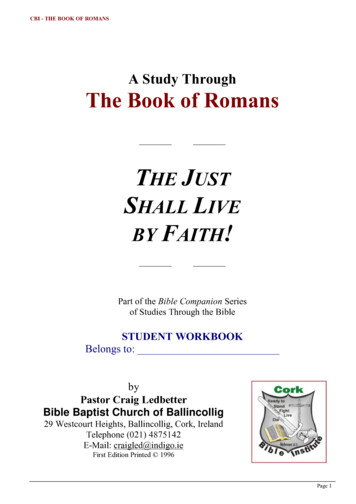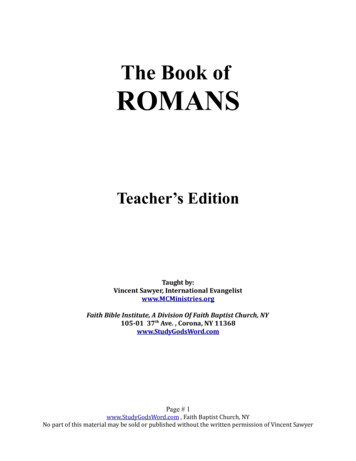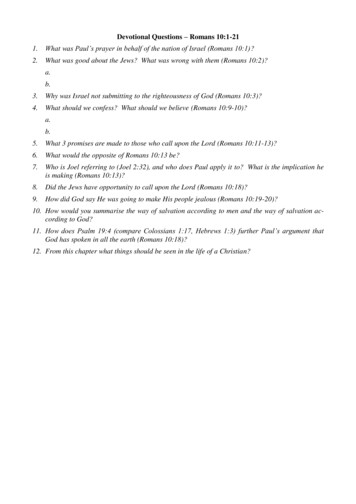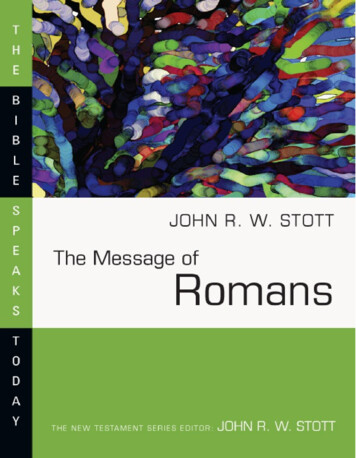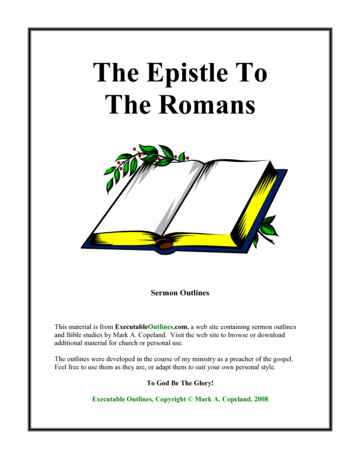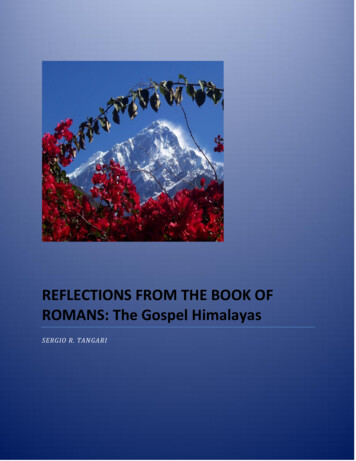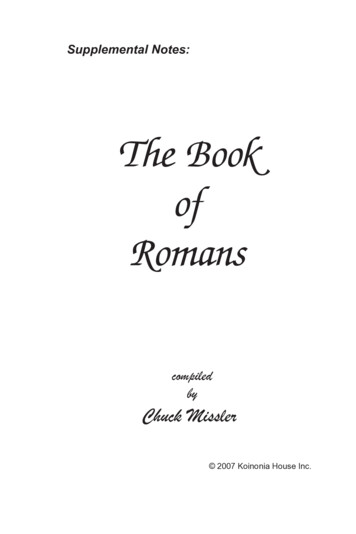
Transcription
Supplemental Notes:The BookofRomanscompiledbyChuck Missler 2007 Koinonia House Inc.
Audio ListingSession 1: Introduction and Romans 1:1 - 1:7Introduction. Salutation. Attributes of the Trinity.Session 2: Romans 1:8 - 1:32The Pagan Predicament. The Need for the Gospel. God’s RighteousnessRevealed Against Pagan Humanity.Session 3: Romans 2AcknowledgmentsThese notes have been assembled from speaking notes and relatedmaterials which had been compiled from a number of classic and contemporary commentaries and other sources detailed in the bibliography,as well as other articles and publications of Koinonia House. Whilewe have attempted to include relevant endnotes and other references,we apologize for any errors or oversights.The complete recordings of the sessions, as well as supporting diagrams,maps, etc., are also available in various audiovisual formats from thepublisher.The Righteousness of God Revealed. Condemnation of Moral Man.Session 4: Romans 3Advantages of Being a Jew? Case Against the Entire Human Race. WhyDoes God Save Anyone?Session 5: Romans 4God’s Greatest Gift. Faith of Abraham and David. Salvation by Faith,not Works. The Resurrection.Session 6: Romans 5Peace With God. The Sequence to Maturity. The Logic of His Love.Two Heads: Adam and Christ.Session 7: Romans 6Two Masters: Sin Personified, and God as Revealed in Jesus. The Deathof Defeat. Baptism. Sanctification.Session 8: Romans 7Law School: The Law and Christ Risen. Dead to the Law. Spirit IsWilling, the Flesh Is Weak.Page Page
Audio ListingSession 9: Romans 8:1 - 17Deliverance from the Flesh by the Power of the Holy Spirit. The HolySpirit’s Inner Witness.Session 10: Romans 8:18 - 27The New Creation. Preservation in Suffering by the Power of the HolySpirit.Session 11: Romans 8:28 - 39Our Eternal Security. Hymn of Praise for Victory. Certainty of Sanctification.Session 12: Romans 9:1 - 5Advantages of Being a Jew? Discussion of the Covenants. The Sceptreof Judah. Eschatological Heresies.Session 13: Romans 9:6 - 13Has the Word of God Failed? Doctrine of Election.Session 14: Romans 9:14 - 33God’s Sovereignty. Moses and Pharaoh. Gentiles Called. StumblingStone.Session 15: Romans 10:1 - 15Rabbinical Expectations. Salvation by Faith Taught by Moses. “Whosoever.” Israel Present.Session 16: Romans 10:16 - 21Audio ListingSession 17: Romans 11:1 - 24Israel’s Future. Salvation unto the Gentiles.Session 18: Romans 11:25Israel’s Future—Part Two.Session 19: Romans 11:25 - 36The Kingdom Parables. Mysteries. “Until.” Rapture Models.Session 20: Romans 12Gifts. Armor. Body Life. Evidences of the Spirit-filled Person.Session 21: Romans 13Civil Responsibilities: to the state; to those outside the Church.Session 22: Romans 14Christian Maturity. Capital Punishment. Dietary Restrictions? The Sabbath Day Dilemma. Sunday or Saturday?Session 23: Romans 15Importance of Unity within the Body. In Light of Christ’s Ministry.Paul’s Methodology and Plans.Session 24: Romans 16Importance of Relationships. A Most Painful Sin, Gossip. ProfessionalSecretaries.Review of Post-Biblical History of Israel up to modern day.Page Page
The Book of Romans Session 1Introduction and Romans 1:1-7Theme: The Grace of God Revealed God’s righteousness,Our iniquity, andGod’s remedy through GraceIt may be that the Deity can forgive sins, but I do not see how.Socrates, to Plato, 360 b.c.GRACE “God’s Riches At Christ’s Expense.”General Background Hal LindseyOrganization of the Old Testament: 5 Books of Moses (Torah)Organization of the New Testament: 4 Gospels Acts (Luke II)(Luke and Acts may have been written as documentation for Paul’sappeal to Rome.)Acts ends with Paul in Rome; his epistle to the Romans appears asa natural continuation.The Role of Romans “The Definitive Gospel According to Paul.”The most comprehensive book in the NT.“The most profound of all literature.”Its impact on History is unequaled:– Grace gradually erodes to forms of legalism.– The years 590-1517 “The Dark Ages.”– Grace becomes obscured (see The Kingdom of Blood briefingpackage).The ReformationIn the year 1483 in Eisleben, Saxony, a baby boy was born to a poorcoal miner. As he grew up and observed the poverty of his father, thisboy, named Martin, chose to pursue a different vocation. He decided tobecome a lawyer and, in 1501, entered the University of Erfurt, wherehe excelled in his studies.Page Page
As he came to the end of his schooling in 1504, an event took placewhich changed his life. While he was walking the campus grounds,a storm broke so forcefully that Martin fell on his face in fear. Thethunder was deafening and lightning struck all around him.Instinctively, he cried out to the patron saint of coal miners, whosename he had heard invoked during his childhood, “Saint Anne! Saveme from the lightening. If you save me I will become a monk.” Shortlythereafter the storm stopped.Being a man of his word, Martin withdrew from Law school and enteredan Augustinian monastery where he applied himself so diligently thathe obtained a Doctorate of Theology within a few years.But the more he studied, the more troubled his heart became; for althoughhe was becoming an expert in theology, he lacked peace personally.The question he repeatedly wrote in his diary was: “How can a manfind favor with God?”In search of such peace, Martin devoted himself to an exceedinglypious life-style: he would fast for ten to fifteen days at a time; whentemperatures dropped below freezing, he slept outside without a blanket. Between his studies, he beat his body until it was black and blueand bleeding—hoping that somehow by punishing his flesh, he couldrid himself of the thoughts and motives that he knew were not right.(These were typical practices of the medieval church.)He went to confession so many times a day that finally the abbot said,“Martin, either go out and commit a sin worth confessing or stop coming here so often.”Finally, in 1509, Martin decided to make a pilgrimage to Rome in hopeof finding the elusive peace for which he longed. He set out on footand crossed the Alps. On his descent, he almost died of a high feverbefore making his way to a monastery at the foot of the mountainsthere the Brothers nursed him back to health. While there, a wise monkapproached him and said, “You need to read the Book of Habakkuk.”And so Martin did just that. He read Habakkuk.Good suggestion. Habakkuk was a struggler just like Martin. Liketoday: If God is good, why does He allow suffering? If there really isa devil, why doesn’t God just obliterate him?Page We throw out questions, then plunge into our personal pursuits—andwonder why we don’t get answers.One verse captured Martin’s imagination: Hab 2:4. “The just shall liveby faith.” He couldn’t get it out of his mind.Having recovered sufficiently to continue his journey to Rome, he wentto the Church of St. John’s Lateran, a typical cathedral of that day.There is a staircase there that is said to be from Pilate’s judgment hall.The existing stairs are four parts: the special inner two are said to havebeen transported there miraculously from Jerusalem. The outer twoare ordinary. The inner steps are not walked on. Here pilgrims mountpainfully on their knees, a step at a time, saying prayers as they go. Thepope had promised an indulgence to all who would undergo this rite.As Martin repeated his prayers on the Lateran staircase, Hab. 2:4 suddenly came into his mind: the just shall life by faith. He ceased hisprayers, returned to the University of Wittenberg, went on to explorethe revolutionary idea of “justification by faith,” and ultimately nailedhis famous 95 theses to the door of the Wittenberg Castle Church, andstarted the movement known today as the Reformation—the single mostimportant event in modern history.1His name, of course, was Martin Luther.The leadership didn’t like the implications of his views and ultimately,at the Diet (council) of Worms (a town) they excommunicated him asa heretic.He went on to write commentaries that are classics today; hymns like,“A Mighty Fortress is our God”; and translated the entire Bible intoGerman, a classic which remains the literary masterpiece in the Germanictongue (Rom 1:15-17; Gal 1:6-9; 3:1-3, 11).Habakkuk 2:4Habakkuk 2:4 has led to a Trilogy of epistles in New Testament: “TheJust Shall Live by Faith.” The Just. (Who are they?).Shall live (How?).By Faith!Page Romans (Rom 1:17)Galatians (Gal 3:11)Hebrews (Heb 10:39)
Each of these epistles use Hab 2:4 as its cornerstone. This indicates thatPaul wrote Hebrews (this is debated by good scholars)The book of Romans became the cornerstone of the Reformation. It ishard to summarize the Reformation’s impact on Western Civilization.Authorship of RomansThat Paul is the author of this letter is denied by almost no one. Eventhe ancient heretics admitted Romans was written by Paul. So do themodern (19th century and later) radical German critics, who deny manyother facts in the Scriptures.He did not address it to “the church in Rome.” That a church did existin Rome is obvious, because Paul sent greetings to the church that metin the home of Aquila and Priscilla (16:5). Probably several churcheswere in Rome; perhaps this multiplicity of churches is why Paul addressed the letter to “the saints” instead of to “the church.”This was not a church founded by Paul. “Visitors from Rome” (Acts2:10) were in the crowd that witnessed the miracle of Pentecost andheard Peter’s sermon. Some of them probably were among the 3,000converts that day and returned to Rome as believers in Jesus Christ topropagate their faith. (These were churches founded by average believers like you and me.)Subsequently, other believers migrated to Rome, for it was a magnetthat drew people from all over the empire for business and other reasons. Aquila and Priscilla are good examples. They had lived in Italybefore (Acts 18:2), and undoubtedly returned as soon as circumstancespermitted. Phoebe (Rom 16:1-2), apparently the courier of this letter,is another example as she was making a trip to Rome for other reasons.In fact, Phoebe’s planned trip to Rome was probably the specific occasion for Paul’s writing this letter. Humanly speaking, Paul seized thisopportunity to communicate with a group of Christians he was deeplyinterested in and planned to visit as soon as possible.Just as Paul’s absence of greeting to Peter in chapter 16 is evidencethat Peter was not in Rome at the time, so his numerous greetings toindividuals (28 persons are named or referred to, plus several groups)reveal the impact of Paul’s ministry on the establishment and the development of the church in Rome. Many of the believers there werePaul’s converts or associates in other parts of the empire. As a resultPage 10Paul had a proprietary interest in the Christian community of Rome.He considered the church there one of his, as this letter bears witness.He was writing to believers, not preaching for them to be converted.Rather, teaching them what salvation is really all about.Though Paul never named the city, it is obvious that he wrote this letterfrom Corinth, Cenchrea (Rom 16:1) being its eastern harbor. The letterwas written at the close of Paul’s third missionary journey during the“three months” he was in Greece (Acts 20:3), just before his return toJerusalem with the offering from the churches of Macedonia and Achaiafor the poor believers there (Rom 15:26). After leaving Corinth, Paulwas in Philippi during the Passover and the Feast of Unleavened Bread(Acts 20:6) and desired to reach Jerusalem by Pentecost (Acts 20:16).The letter was written, therefore, in the late winter or early spring ofa.d. 57 or 58.Paul was not an unlettered fisherman: this is the most profound writingthat exists anywhere. It has an international outlook: Paul was a Romancitizen, with both Hebrew and Greek culture of history, religion, philosophy, poetry, science, music, etc. Yet, he was also a Hebrew of Hebrews,born in Tarsus of Cilicia; he studied under Gamaliel in Jerusalem.This is a book which will delight the greatest logician; hold the attention of the wisest of men; and will bring the humblest soul in tears ofrepentance to the feet of the Savior.A God small enough for our mind would not be big enough for ourneed.The OutlineChapters 1 - 8FAITHDoctrinal- 1-3 Sin (the most complete diagnosis)- 4-5 Salvation- 6-8 SanctificationChapters 9-11HOPE- 9 Israel - Past- 10 Israel - Present- 11 Israel - FutureDispensationalChapters 12-16PracticalLOVEPage 11
Chapter 1 Summaryverses: 1-78-1718-32[It was a “setting apart” to something—a commitment and dedication,not from things in isolation like the Pharisees. Interestingly, the word“Pharisee” means “separated one” in the sense of being isolated andsegregated. What are you “separated to”?]SalutationIntroduction: reasons for writingNeed for the GospelWhen? Before birth! (Jer 1:5; Jn 15:16; Eph 1:4). [The doctrine ofelection was a cause for attack on Christ at the very beginning (Lk4:24-29).]Romans 11]Paul, a servant of Jesus Christ, called to be an apostle, separated unto the gospelof God,The GospelThis first word alone could be an entire sermon: Paulus, a rebuttal tothe numerous critics who masquerade as believers.The Gospel is not a code of ethics or morals; not a creed to be accepted; nota system of religion to be adhered to; not a good advice to follow.“Paul” the least; the little one. He really understood the grace ofGod. “I am the chief of sinners” (1 Tim 1:12-15). Significantly, themost devoutly religious man who ever lived! (Phil 3:1ff). [So God hasalready saved one who is far worse than you or me!. Who loved Himmost in Luke 7:39-43?]It is a divine Person, Jesus Christ. He died for our sins, according tothe Scriptures; He was buried and rose again the third day, accordingto the Scriptures (1 Cor 15:3-4).Consider the story of the Prodigal Son (Luke 15): Did the Father say,“My son has become good”? No! “For this my son was dead, and isalive again; he was lost, and is found!”“Servant” (doulos) means slave, a person owned by another; specifically, a bondslave. Paul reveled in this title (Gal 1:10; Titus 1:1), anOld Testament designation of a slave who, in love, binds himself tohis master for life (Ex 21:2-6). [The name “Coeur d’Alene” suggests“heart of the doulos”.]“An Apostle”: one sent with delegated authority (cf. Mt 10:1-2)—aposition to which he was called. (Lit., the Greek is, “a called apostle.”)Founding apostles had to be an eyewitness (1 Cor 9:1; 15:1-9). Thiscalling was from God (Acts 9:15; Gal 1:1), though it was acknowledgedby men (Gal 2:7-9). (The “least”; 1 Cor 15:9. And yet he dominatesthe Book of Acts and wrote 14 of the 21 epistles in the NT!)“Separated”: It involved being “set apart” (from avfori,zw, aphorizo,cf. Acts 13:2, the same word from which we get our word horizon) forthe gospel of God, the message of good news from God that centeredon “His Son” (Rom 1:2, 9) which Paul was “eager to preach” (v. 15)without shame (v. 16).This “setting apart” did not keep Paul from independent employment(“making tents”) to support himself and his companions (Acts 20:34;1 Thess 2:9; 2 Thess 3:8), nor from mingling freely with all levels ofpagan society.Page 12Christ did not come to make bad men good; but to give dead men life!The Book of Romans is the most complete and penetrating statementof God’s divine plan for the redemption that God has given us. (By theway, the Prodigal Son never lost his “sonship.”)“Promised Afore”2](Which he had promised afore by his prophets in the holy scriptures,)“Holy Scriptures” refers to the Old Testament. It occurs only here inthe New Testament (2 Tim 3:15 uses different Greek words for “holyScriptures.”)“Promised afore.” God is distinctive in His keeping His promises. [vs.Allah, et al.] The gospel is not brand new: It was promised by Hisprophets all the way through the Old Testament. Prophecy an undeniable authentication of His Word.“To Him give all the prophets witness.” Acts 10:43. [Inaccuracy resultedin death, Deut 18:20. There were lots of rock piles in Israel!]Page 13
What “had been promised afore?” The Gospel! ( a person!) His firstpromise of redemption (Gen 3:15). Messianic details: family, birthplace,etc. (See Footprints of the Messiah briefing package.)Hidden in Genesis 5 (cf. Isa 53:11; Jer 23:6; 33:16; 1 Cor 15:1-8). Philip’suse of Isaiah 53:7-8 with the Ethiopian eunuch is a good example (Acts8:30-35; cf. Luke 24:25-27, 45-47). Paul will also use Gen 18 and 22in chapter 4.3]Claims to DeityAnd declared to be the Son of God with power, according to the spirit of holiness, by the resurrection from the dead:The resurrection declared Him to be the Son of God because it validatedHis claims to deity and His predictions that He would rise from the dead(Jn 2:18-22; Mt 16:21).“The Spirit of Holiness”: This is the Holy Spirit, and not, as some havesuggested, Christ’s human spirit. [See Trinity excerpts in the Supplemental Topic in the following pages.]5]Objective genitive: obedience (produced by) faith. Obedience and faithare often linked (cf. 15:18; 16:26; also cf. 1 Peter 1:2). Obedience tothe Lord as our King is too often overlooked as the essential in ourChristian walk!6]Concerning his Son Jesus Christ our Lord, which was made of the seed of Davidaccording to the flesh;This asserts Christ’s deity as basic to His person and prior to His Incarnation, since His identification with David’s line “came to be,” theliteral rendering of the participle genomenou, translated “was made.”He was genuinely human too, as declared by His linkage with Davidand (v.4) His resurrection from the dead.4]Obedience to the FaithBy whom we have received grace and apostleship, for obedience to the faithamong all nations, for his name:Paul’s ministry from Jesus was “among all the nations,” which includedthe Romans, whom Paul addressed not as a church but as individualbelievers.Paul was the human agent from and for Christ he received “the graceof apostleship” (cf. Rom 12:3; 15:15), but the calling (God’s summonsto salvation; cf. Rom 8:28, 30) came from the Lord and set his readersapart as “saints.”Page 14Among whom are ye also the called of Jesus Christ:Just as Paul was a “called” apostle, so the believers in Rome were “calledof Jesus Christ” to be saints.Paul’s Salutation7]To all that be in Rome, beloved of God, called to be saints: Grace to you andpeace from God our Father, and the Lord Jesus Christ.Paul’s salutation, like that in all his epistles, expressed the desire thatthey enjoy God’s grace (Gr. charas) and peace (Heb. shalom). Writtento believers: the unsaved are never named God’s “beloved.”Not preaching to the unsaved; teaching the saints:A group of displaced persons, uprooted from their natural home, and ontheir way to an extraterrestrial destination; not of this planet, neither inroots nor in its ideals.—BarnhouseSupplemental Topic:The Trinity(Excerpted from the briefing package, The Trinity, Koinonia House,1995.)Works of God[Each declared to be wrought wholly, and independently, by eachperson:]1) Creation of the Universe:Father:Ps 102:25Son:Col 1:16; John 1:1-3Spirit:Gen 1:2; Job 26:13.All three gathered into Elohim, Gen 1:1.Page 15
2) Creation of Man:Father:Gen 2:7Son:Col 1:16Spirit:Job 33:4.Plurals: Eccl 12:1; Isa 54:53) The Incarnation:Father:Heb 10:5Son:Phil 2:7Spirit:Luke 1:35Spirit generates the Son, but in such a manner that the Son addressesthe First Person as Father. (Except on the cross: “My God.”)4) The Life and Ministry of Christ:The Son always did the will of the Father, and to this endthe Spirit was given to the Son without measure.5) The Death of Christ:Father:Ps 22:15; Rom 8:32; John 3:16Son:John 10:18; Gal 2:20Spirit:Heb 9:146) The Atonement:Father:Son:Spirit:Isa 53:6, 10Eph 5:2Heb 9:147) The Resurrection of Christ:Father:Acts 2:24; Rom 6:4Son:John 10:17, 18; John 2:19Spirit:1 Pet 3:18; Rom 8:118) The Resurrection of All Mankind:Father:John 5:21Son:John 5:21Spirit:Rom 8:119) The Inspiration of the Scriptures:Father:2 Tim 3:16Son:1 Pet 1:10,11Spirit:2 Pet 1:21Page 1610) Minister’s Authority:Father:2 Cor 3:5,6Son:1 Tim 1:12Spirit:Acts 20:2811) The Indwelling Presence [Surprised?]:Father:Eph 4:6Son:Col 1:27Spirit:1 Cor 6:1912) The Work of Sanctification:Father:Jude 1:1Son:Heb 2:11Spirit:1 Cor 6:1113) The Believer’s Safekeeping:Father:John 10:29Son:John 10:28; Rom 8:34 (4 ways!)Spirit:Eph 4:3014) Others:Wisdom: Cf. 1 Cor 1:24 with Ps 8, Logos of Jn 1:1-18, et al.Attributes of GodAll attributes are ascribed to each of the three.Eternal existence:Father:Son:Spirit:Ps 90:2;Alpha and Omega, First and Last (Rev 1:8, 17;Jn 1:2; Micah 5:2; cf. Zech 12:10 (Heb); Gen1:1; Also Isa 41:4.)Heb 9:14.Infinite Power:Father:Son:Spirit:1 Pet 1:52 Cor 12:9Rom 15:19Omniscience:Father:Son:Spirit:Jer 17:10Rev 2:231 Cor 2:11Page 17
Omnipresence:Father:Son:Spirit:Jer 23:24Mt 18:20Ps 139:7Holiness:Father:Rev 15:4Son:Acts 3:14Spirit:(everywhere: “Holy Spirit”)Thus, “Holy, Holy, Holy”—Isa 6:3Next SessionRead (and outline) Chapter 1. Read the next seven chapters. (Thereare 413 verses in the Epistle to the Romans. At the rate of seven persession, we should finish in 58 more sessions!)Notes:1.2.Truth:Father:Son:Spirit:John 7:28Rev 3:71 John 5:6Benevolence:Father:Son:Spirit:Rom 2:4Eph 5:25Neh 9:20The Book of Romans Session 2Romans 1:8 - 1:32The Pagan PredicamentReviewDisposition for communion:Father:1 John 1:3Son:1 John 1:3Spirit:2 Cor 13:14The last half of Acts is mostly about Paul; it ends with him going toRome, so it’s appropriate the epistle to follow Acts is Romans. It is acontinuation of Acts in many ways.Romans is the most comprehensive statement of the Gospel in the entireBible. Some call it the “Gospel according to Paul.”There is no intimation that one person of the Godhead sustains theseattributes in respect to the other two persons; or that they are held inpartnership.The impact of Romans on world history is unequalled by any otherbook of the Bible. The years a.d. 590 - 1517 are known as “The DarkAges”; during this time, the grace of God was nearly obscured. Theearly church understood the grace of God, but grace gradually erodedinto forms of legalism. The reemergence of an awareness of the graceof God led to the Reformation.All is predicated of each as though no others existed. The peculiar relationship of One in Three, and Three in One, is upheld apart from thoseusual interdependent sharing which characterize human combinationsand manifestations.The fact that each person posses all the divine characteristics and socompletely that it would seem that no other need to possess them, speaksof the distinction between the Persons as such. On the other hand, thefact that they all manifest these characteristics in identically the sameways and to the same measure, speaks of the unity from which theirmode of existence springs.” 2The Predicament of: 7]Page 18Manuscript by his son D. Paul Luther preserved in the library at Rudolstadt,quoted by F.W. Boreham in A Bunch of Everlastings or Texts That Made History, Judson Press, Philadelphia, 1920, p. 20. Also, see Courson, p. 33-38.Chafer, Lewis Sperry, Systematic Theology, (8 vols), Dallas Seminary Press,Dallas, TX, 1946, vol 1, p. 305.Romans 1: The “Pagan Man”Romans 2: The “Moral Man”Romans 3: The “Religious Man”To all that be in Rome, beloved of God, called to be saints: Grace to you andpeace from God our Father, and the Lord Jesus Christ.Page 19
Paul’s salutation, like that in all his epistles, expressed the desire thatthey enjoy God’s grace (Greek charas) and peace (Hebrew shalom).His epistle was written to believers: the unsaved are never named God’s“beloved.”Introduction and Reasons for Writing8]First, I thank my God through Jesus Christ for you all, that your faith is spokenof throughout the whole world.Paul made a practice of beginning his letters with a word of thanksto God, a specific prayer, and a personal message to the recipients.Herejoiced that news of their faith had spread all over the (known) world,(i.e., the Roman Empire). This was accomplished without modern travelor communications9]For God is my witness, whom I serve with my spirit in the gospel of his Son,that without ceasing I make mention of you always in my prayers;Paul’s service was not “soulish”—not psychikos, but pneumatikos:spiritual (1 Cor 2:14). He did not depend upon music, architecture, ororatory; he simply taught the truth of the Word and the results of theSpirit.10] Making request, if by any means now at length I might have a prosperousjourney by the will of God to come unto you.His constant intercession for them had the new note of petition for hisprojected visit (vv. 9-10); a heart-desire of long standing that finallywas definitely on Paul’s agenda (v. 10; cf.15:23-24).11] For I long to see you, that I may impart unto you some spiritual gift, to the endye may be established;We must keep the “personal letter” spirit of Romans before us if we areto be truly benefitted by it. Just as Paul told Timothy to teach, exhort,charge, command, rebuke, to be urgent in season and out of season—somust we exhort, command, rebuke, etc. (2 Tim 4:2).Spiritually Beneficial Visit12] That is, that I may be comforted together with you by the mutual faith both ofyou and me.Page 20This visit would be mutually beneficial spiritually; he desired to ministerfor three purposes:1) to the strengthening of the Romans (1:11; “to impart some spiritualgift” means either to exercise his own spiritual gift on their behalfor to bestow on them spiritual favors, i.e., blessings),2) to see some spiritual fruit (a harvest, v. 13) among them and, inturn,3) to be strengthened by them (v. 12). In this sense Paul’s ministryat Rome would be the same as in other centers of the empire.13] Now I would not have you ignorant, brethren, that oftentimes I purposed tocome unto you, (but was let hitherto,) that I might have some fruit among youalso, even as among other Gentiles.Cf. Rom 15:19, 22, 23.14] I am debtor both to the Greeks, and to the Barbarians; both to the wise, and tothe unwise.Paul a DebtorAs a result of his “apostleship” (v. 5) to the Gentiles, Paul felt obligated(lit., “I am a debtor”) to the entire human race to proclaim God’s goodnews (vv. 14-15). [Contrast this with Moses in Num 11:11-15!]To the Jew, the whole world was divided into Jews (Ioudaioi) and Greeks(Hellenes), religious prerogative being taken as the line of demarcation.To the Greek and Roman, the world was similarly divided into Greeks(Hellenes) and Barbarians (Barbaroi), “non-Greeks,” civilization beingthe criterion of distinction (Cf. Col 3:11, Scythians being an extremeexample of savageness).Parallel to it is the word foolish, unwise, (avno,htoj, anoetos, cf. Titus 3:3)in the next couplet, which has the significance of being uncultured.15] So, as much as in me is, I am ready to preach the gospel to you that are atRome also.Paul’s sense of debt to the Gentile world produced an eagerness toevangelize it, including the capital of the known world, Rome. Talk ofguts! Rome shook the entire world: it was the center of everything.And Paul went there with “just the Gospel.”Page 21
Four “For’s”The Theme of the LetterThe summary text and core of the entire epistle (Romans 1:16-18):1) The Gospel;2) Its universal saving power;3) Its secret is the revelation of God’s righteousness on theprinciple of faith; and4) Its accord with the Old Testament (Hab 2:4).16] For I am not ashamed of the gospel of Christ: for it is the power of God untosalvation to every one that believeth; to the Jew first, and also to the Greek.The theme of the letter. Paul gladly proclaimed it as God’s panaceafor mankind’s spiritual need. He identified it as the infinite resources(dynamis, “power,” or spiritual ability) of God applied toward the goalof salvation in the life of everyone who believes, regardless of racialbackground.Paul’s eagerness to evangelize sprang also from his estimate of his message, the gospel (1 Cor 15:1-4). [This is the 4th of 5 times Paul used theword “gospel”: vv. 1, 9, 15-17.]“The power of God unto salvation.” Not unto reformation, education,progress, nor development, nor “fanning an innate flame.” It is for lostman and no other. Men are involved either in salvation or in its opposite, perdition (Phil 1:28).He acknowledged, however, a priority for the Jew expressed in the Wordfirst, which has sufficient textual support here and is unquestioned inRomans 2:9-10. Because the Jews were God’s Chosen People (Rom11:1), the custodians of God’s revelation (Rom 3:2), and the peoplethrough whom Christ came (Rom 9:5), they have a preference of privilege expressed historically in a chronological priority. Jesus stated it,“Salvation is from the Jews” (Jn 4:22).In Paul’s ministry he sought out the Jews first in every new city (Acts13:5, 14; 14:1; 17:2, 10, 17; 18:4, 19; 19:8). Three times he respondedto their rejection of his message by turning to the Gentiles (Acts 13:46;18:6; 28:25-28; cf. Eph 1:12). Today, evangelism of the world mustinclude the Jews, but the chronological priority of the Jews has beenfulfilled. There is now no distinction between Jew and Greek either inthe fact of sin (Rom 3:22) or the availability of salvation (Rom 10:12).Cf. Gal 3:28; Col 3:11.Page 2217] For therein is the righteousness of God revealed from faith to faith: as it iswritten, The just shall live by faith.The theme of the letter The righteousness from God is revealed.The subjective genitive (lit., “of God”) identifies this as a righteousnessthat God provides for people on the basis of and in response to faith inthe gospel (cf. 3:22). The Greek proposition ek, “out of,” or “from.”God declares men righteous not by faith as the procuring cause, for theblood of Christ was that; not by faith as the putting forth of a certainfaculty innate in man, much less by the keeping of divine commands,however holy and just; but out of reliance upon His own Word as true,and that alon
Session 16: Romans 10:16 - 21 Review of Post-Biblical History of Israel up to modern day. Audio Listing Session 17: Romans 11:1 - 24 Israel’s Future. Salvation unto the Gentiles. Session 18: Romans 11:25 Israel’s Future—Part Two. Session 19: Romans 11:25 - 36 The Kingdom Parables. Mysteries. “Until.
